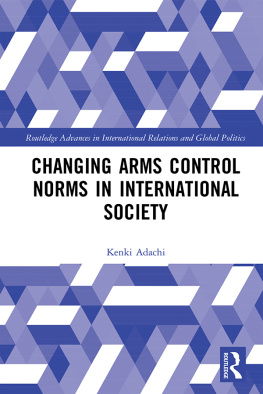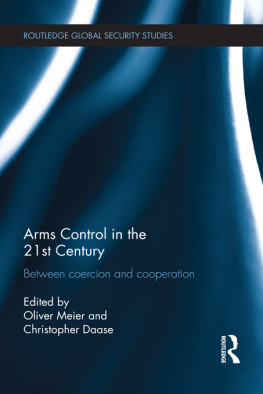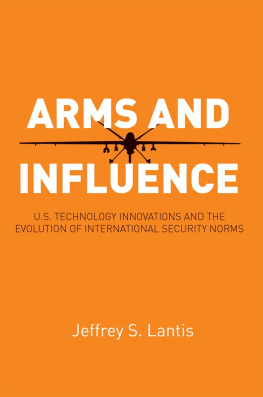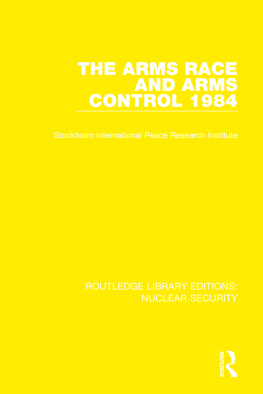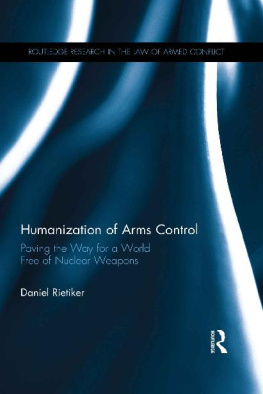Changing Arms Control Norms in International Society
When states survival is at stake, do states behave according to norms, do states refrain from using certain weapons based on norms against their use?
Adachi presents a comprehensive analytical framework for analysing norm dynamics, incorporating the existing literature, while expanding the norm life cycle model to address contestation of, resistance to diffusion of, and disappearance of norms. He also examines the changing nature of international society, and how the evolving characteristics of this society change how norms are shared. His focus is on norms relating to the use and non-use of weapons, with examples of how norms developed in different places and at different times with regard to particular types of weapons. From the banning of gun use in Japan under Bushido, to international bans on chemical weapons and the foundation of norms on nuclear weapons, he looks not only at how such norms come about, but how they can become contested or disappear.
A valuable contribution to the literature on norms in International Relations, this volume will be of particular interest to scholars and students with an interest in the control of arms.
Kenki Adachi is Director of Institute of International Relations and Area Study (IIRAS) and Professor of International Politics at Ritsumeikan University, Japan. His works include Norm Antipreneurs: The Politics of Resistance to Global Normative Change (2016, chapter contribution), Norms in International Society: When States Refrain from Using Certain Weapons (2015), and The Ottawa Process: Formation Process of the Landmine Ban Regime (2004) which won 2004 Canadian Prime Minister Award.
Routledge Advances in International Relations and Global Politics
Exploring Base Politics
How Host Countries Shape the Network of U.S. Overseas Bases
Edited by Shinji Kawana and Minori Takahashi
United Nations Financial Sanctions
Edited by Sachiko Yoshimura
Operational Code Analysis and Foreign Policy Roles
Crossing Simons Bridge
Edited by Mark Schafer and Stephen G. Walker
Social Media Impacts on Conflict and Democracy
The Techtonic Shift
Edited by Lisa Schirch
Changing Arms Control Norms in International Society
Kenki Adachi
The Frontiers of Public Diplomacy
Hegemony, Morality and Power in the International Sphere
Colin R. Alexander
Security and Safety in the Era of Global Risks
Edited by Radomir Compel and Rosalie Arcala Hall
Laws of Politics
Their Operations in Democracies and Dictatorships
Alfred G. Cuzn
For information about the series: https://www.routledge.com/Routledge-Advances-in-International-Relations-and-Global-Politics/book-series/IRGP
First published 2021
by Routledge
2 Park Square, Milton Park, Abingdon, Oxon OX14 4RN
and by Routledge
52 Vanderbilt Avenue, New York, NY 10017
Routledge is an imprint of the Taylor & Francis Group, an informa business
2021 Kenki Adachi
The right of Kenki Adachi to be identified as author of this work has been asserted by him in accordance with sections 77 and 78 of the Copyright, Designs and Patents Act 1988.
All rights reserved. No part of this book may be reprinted or reproduced or utilised in any form or by any electronic, mechanical, or other means, now known or hereafter invented, including photocopying and recording, or in any information storage or retrieval system, without permission in writing from the publishers.
Trademark notice: Product or corporate names may be trademarks or registered trademarks, and are used only for identification and explanation without intent to infringe.
British Library Cataloguing-in-Publication Data
A catalogue record for this book is available from the British Library
Library of Congress Cataloging-in-Publication Data
A catalog record has been requested for this book
ISBN: 978-0-367-74169-3 (hbk)
ISBN: 978-0-367-74168-6 (pbk)
ISBN: 978-1-003-15637-6 (ebk)
The study of norms how they emerge, spread and influence the behavior of people and states is no longer a new area in International Relations (IR). But there still remain gaps in the literature and hence opportunities for creative and exciting research to fill these gaps. Professor Kenki Adachis book, Changing Arms Control Norms in International Society, is one such outstanding effort.
The theory of Constructivism, in which much of the research and debate on norm diffusion is situated, is relatively new, especially compared to Realism and Liberalism, two of the major approaches that have historically dominated the field of IR. Like these two theories, Constructivism emerged in the West in the 1990s, especially with the work of Alexander Wendt, although its assumptions and arguments had been foreshadowed in earlier theories, including the international society perspective that developed in the UK (also known as the English School of IR), and in other disciplines, particularly the structuration theory of sociology. At its birth, Constructivism in general and the study of norm dynamics (i.e., origins, spread and impact of norms) in particular, remained Western centric; taking footholds mainly in the US and Europe. No surprises here; this has been the case with IR as a whole. One would have expected that a theory that emerged relatively late, when decolonization had already been substantially accomplished, with the number of independent states and people living in the non-Western world vastly outnumbering those in the West, would account for the normative aspirations and agency of the new states. But not so; the early norm literature also focused almost exclusively on the moral proselytism of Western norm entrepreneurs, and on issues of concern to Western societies. At the same time, their efforts were deemed to have a universal relevance, creating global normative structure in which non-Western countries, including relatively large ones such as India and China or wealthy ones like Japan, were cast in the role of passive pupils, rather than active builders and contributors.
Subsequent critique and research on norms have shown the explanatory limitations of this approach and revealed a more complex picture. It has shown that contributions to global norm creation and diffusion process come from many difference places, involving diverse actors and more importantly, these contributions can take multiple forms or types of agency. Especially important are cases where states, societies and individuals who consciously choose to accept certain norms while rejecting others, and/or modify those they accept to fit their own context and need. This process, which is called constitutive localization, is an authentic and ubiquitous form of normative agency.
Professor Adachis book falls within such efforts to broaden the discussion of actors and agency in norm dynamics. It investigates, from a deeply historical and theoretical perspective, how the norm against weapons emerged and diffused. Although comparative in scope, many readers will find its discussion of Japan especially interesting and important, since the early history of Japans response to international norms is poorly known or understood in the West, and in the wider IR norm literature generally.
The picture that emerges from this book is that the norm against weapons (and I would add that all modern norms) has multiple civilizational origins. Professor Adachi mentions Indian sage Manus prohibition against certain types of weapons and the use of weapons in general against certain type of targets, including civilians, wounded, and unarmed combatants. But the European principles and practices against weapons-use became globally influential, thanks to the rise of Europe in the age of imperialism, and its corollary, the standard of civilization principle. That principle, which became the foundation of modern international law, was aggressively racial and self-legitimizing for Europes global dominance. It had nothing to do with civilization in its usual cultural or ideational sense. Rather, it had political and strategic purpose, which judged countries in terms of their largely material ability to provide law and order (mainly the security for the life and property of Europeans living in their territories), and develop the capacity not only to defend themselves, but also to participate in imperial operations beyond their borders (sometimes in cooperation with the European and Western powers). As such, some of the earliest and most advanced civilizations in the world, including India, China and Egypt, were judged to have fallen short of the European standard of civilization and hence excluded from the international society that the European claimed to have constructed, and were thereby deemed worthy of colonization and dominance.

